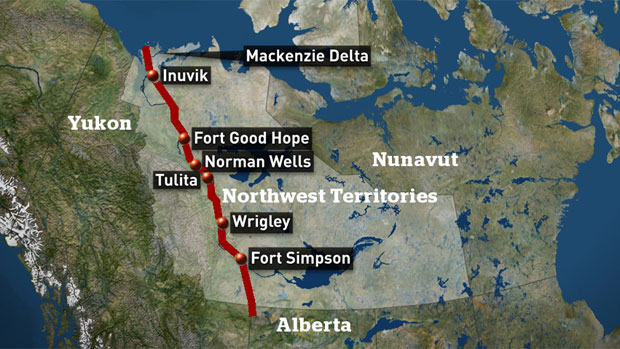Mackenzie Pipeline OK’d by Canadian Cabinet, Energy Board
 The National Energy Board has granted final approval for the Mackenzie Valley natural gas pipeline after the Canadian federal cabinet signed off on the long-delayed $16.2-billion project.
The National Energy Board has granted final approval for the Mackenzie Valley natural gas pipeline after the Canadian federal cabinet signed off on the long-delayed $16.2-billion project.
“Having received approval from the federal cabinet the National Energy Board has issued a Certificate of Public Convenience and Necessity for the … Mackenzie Valley Pipeline,” the NEB said in a statement Thursday.
That means the project, which had been tied up in formal regulatory processes for more than six years, has been given all necessary levels of government approval, although approvals from several other government agencies and local boards are still needed before construction could actually begin.
“I think this is another great day for the Northwest Territories,” N.W.T. Industry Minister Bob McLeod said in the territorial legislature Thursday afternoon.
A consortium of companies backing the 1,200-kilometre pipeline, led by Calgary-based Imperial Oil, must now decide whether to go ahead with the project. The NEB has given the companies until the end of 2013 to make that decision.
“It has been a long journey and a long process and we’re obviously pleased to see this,” Imperial spokesman Pius Rolheiser told The Canadian Press.
Fiscal framework to be worked out
Imperial’s consortium, which includes Exxon Mobil Corp., ConocoPhillips, Royal Dutch Shell PLC, and the Aboriginal Pipeline Group, wants to build the pipeline from anchor fields off the Beaufort Sea coast, through the Mackenzie Valley in the Northwest Territories to the Alberta border, where it would link to southern markets.
The companies’ next step is to resume negotiations with the federal government over a fiscal framework for the project.
The Aboriginal Pipeline Group, which represents several N.W.T. aboriginal groups along the pipeline route, says it will now lobby the federal government to help finance the project with a loan guarantee, similar to what the U.S. government provided to a gas pipeline being proposed in Alaska.
“What we would ask is that the people keep pushing along with us to get the government to step up to the plate, like the American government did, and provide a loan guarantee that will make this project happen,” APG chairman Fred Carmichael told CBC News.
More than two years ago, then-environment minister Jim Prentice announced Ottawa had offered a financial package to the Mackenzie partners. Talks were put on hold until the regulatory process wrapped up.
“Our objective is to work with the government to develop a framework that provides an appropriate balance of risk and benefit, not only for the project proponents, but for the government of Canada as well,” Rolheiser said.
Following that, Imperial and its partners will need to obtain about 6,000 permits from various government departments, restaff the project and resume engineering work.
Given the “tremendous” amount of work ahead, the very earliest Imperial would be in a position to decide whether to go ahead with the project is late 2013, with start-up expected around five years later, Rolheiser said.



